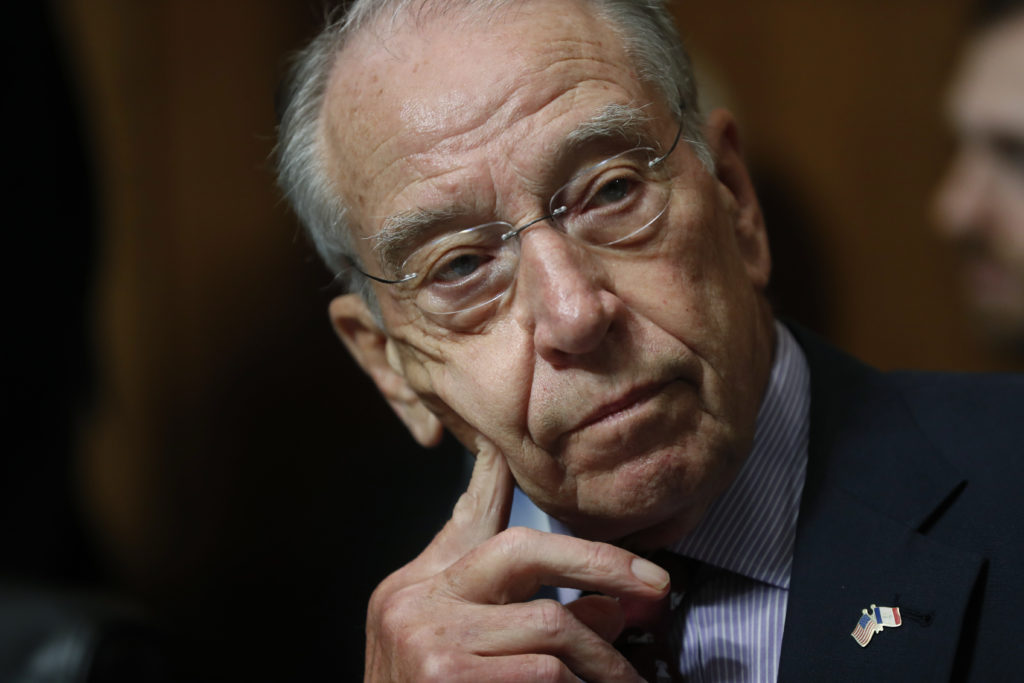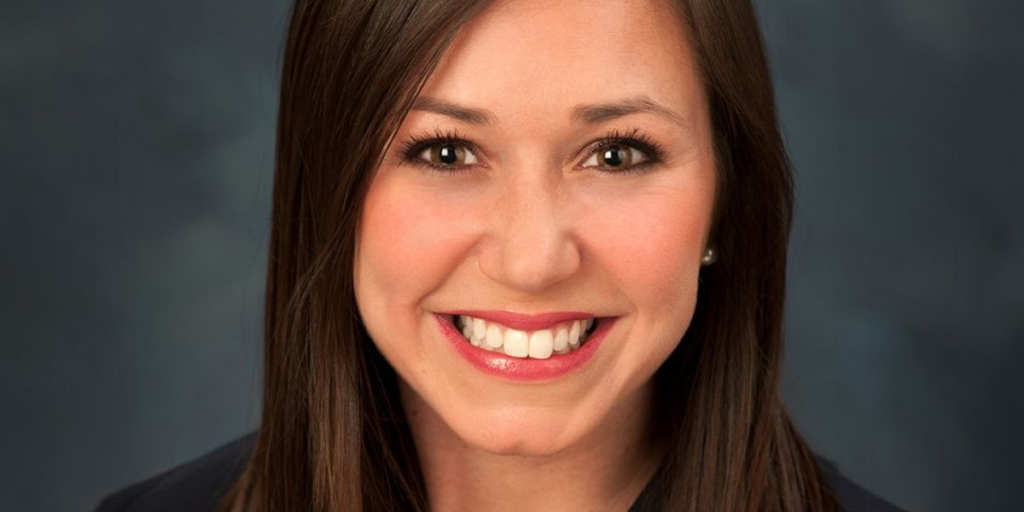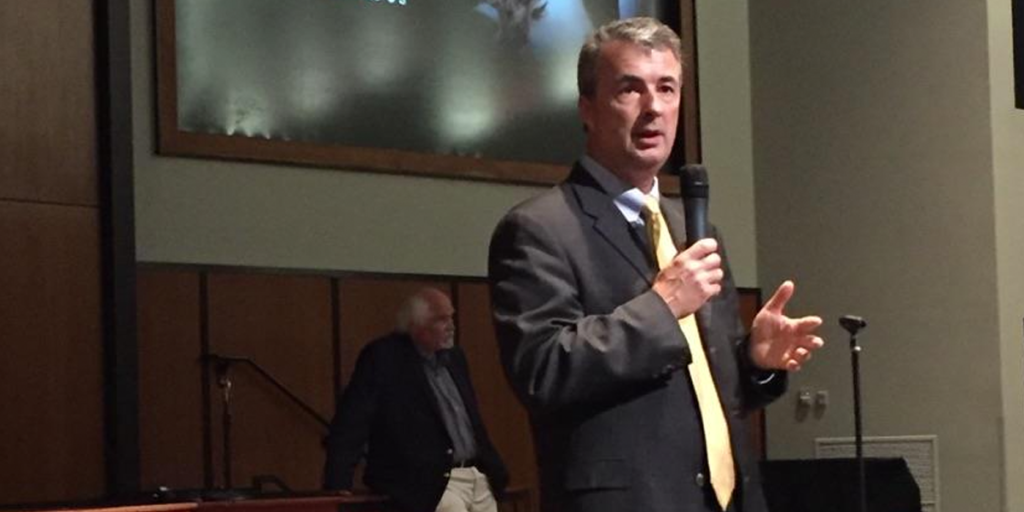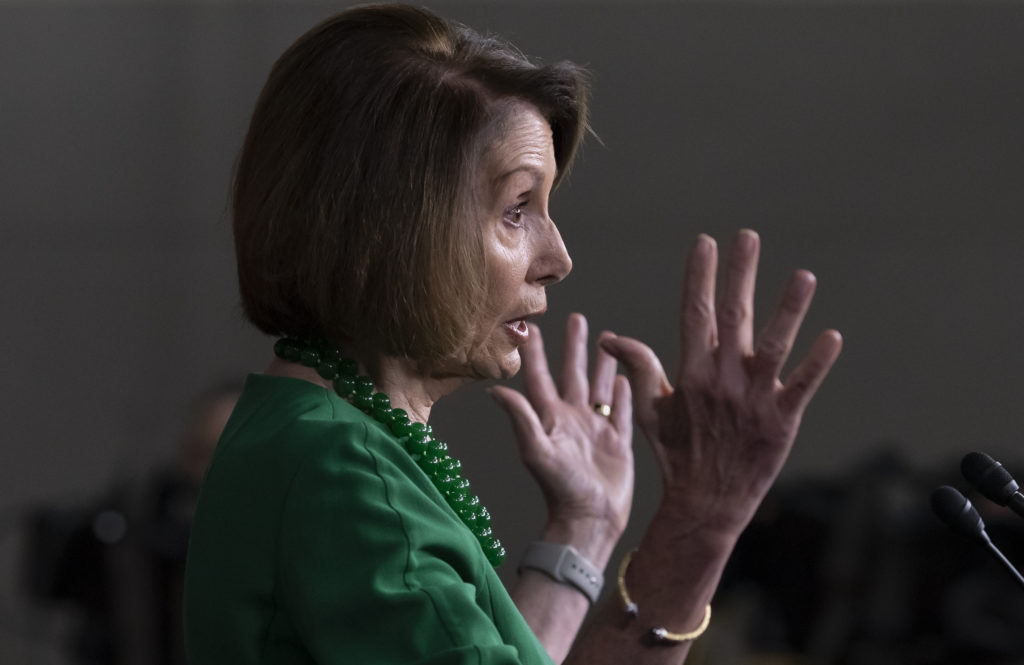Mitch McConnell blocks sentencing bill, upsetting Chuck Grassley, GOP

Senate Majority Leader Mitch McConnell‘s reluctance to hold a vote on a popular criminal justice bill has angered top Republican senators and created an unusual rift with a longtime GOP ally, Sen. Chuck Grassley of Iowa. Grassley has spent years working to build a coalition around the bill and is pushing for a year-end vote. Grassley says more than two-thirds of the Senate supports it. But McConnell is refusing to bring the legislation forward in a standoff that’s dividing the Republican majority and putting President Donald Trump on the spot. “We’ve done what needs to be done,” Grassley said about the overwhelming support for the bill. “So what’s holding it up?” For the 85-year-old chairman of the Judiciary Committee, this is not the way Senate is supposed to operate. Grassley was expecting some deference from McConnell after delivering on Trump’s judicial nominees — including two now on the Supreme Court. Trump backs the criminal justice bill, too, but McConnell says it’s divisive. His reluctance to take up Grassley’s priority shows the limits of the Senate’s old-fashioned customs in an era of heightened partisan politics. “What’s so irritating about this is, first of all, he and I have been hand-in-glove working to get the judiciary vacancies filled,” Grassley told Iowa reporters. “I think I ought to have some consideration for delivering on tough Supreme Court nominees, and a lot of tough circuit court nominees and maybe even once in a while you get a tough district court nominee,” Grassley went on. On Friday, Sen. Lindsey Graham, R-S.C., intervened, talking directly to Trump about attaching the criminal justice legislation to the must-pass year-end spending bill, which is already tangled in a separate fight over funds for the border wall with Mexico. “Just talked with President,” Graham tweeted. “He strongly believes criminal justice reform bill must pass now. He also indicated he supports putting criminal justice reform bill on year-end spending bill which must include MORE wall funding.” Trump has called senators about the bill and spoke briefly about it Friday at an event on safe neighborhoods in Kansas City. The bill is a project of Trump’s son-in-law, White House adviser Jared Kushner, and would be the biggest sentencing overhaul in decades. It would reduce mandatory prison terms for certain drug crimes and give judges in some cases more discretion on punishments. It would allow about 2,600 federal prisoners sentenced for crack cocaine offenses before August 2010 the opportunity to petition for a reduced penalty. It also includes provisions to encourage education and workforce training in prisons. Roughly 90 percent of prison inmates are held in state facilities and would not be affected by the legislation. While Kushner has been meeting with senators on Capitol Hill, Trump is also hearing from allies who are against the legislation. Chief among them is Sen. Tom Cotton, R-Ark., who is warning senators that Republicans will be blamed if criminals are released and commit new crimes. “Only thing worse than early release from prison of thousands of serious, violent, & repeat felons is to do that in a spending bill with no debate or amendments, forcing senators to either shut down government or let felons out of prison,” Cotton tweeted Friday. The spending bill will need approval by Dec. 21 to avoid a funding lapse days before Christmas. “If the jailbreak bill gets stuck in the spending bill, everyone bring your stockings to the Senate, because we’ll be there on Christmas!” Cotton and others, including Sen. John Cornyn of Texas, No. 2 Senate Republican, insist there is not as much support for the bill as Grassley claims. Cotton says senators may tell the chairman they’re in favor of it when actually they’re not. The bill has support from several conservative and liberal advocacy groups, uniting such disparate partners as the influential Koch network and the American Civil Liberty Union, but it splits law enforcement groups. It is backed by the Fraternal Order of Police and the International Association of Chiefs of Police but opposed by the National Sheriff’s Association. Amid this divide, McConnell has been choosing caution, saying there’s just not enough time to push the bill forward in the remaining days of the Congress. “The question is, can you shoe-horn something that’s extremely controversial into the remaining time?” he said Monday in an interview at a Wall Street Journal forum. Criminal justice reform has traditionally been a Democratic priority, as Republicans prefer a more tough-on-crime approach. And McConnell acknowledges it’s “extremely divisive” among Senate Republicans. Leaders tend to protect senators from taking tough votes that could have political blowback. “I don’t see from a timing standpoint how we get it done in the short amount of time we have to work with, but everyone is trying to keep their options open and not foreclose the possibility it could happen,” said Sen. John Thune, the third-ranking Senate Republican. Sen. Rand Paul, R-Ky., said Thursday that bill backers are making a last-push to attach it to the spending measure and picking up new supporters. But he acknowledged the package’s chances are slipping with each passing day. “We’re still lobbying Sen. McConnell — he has all the power to allow it or not allow it,” said Paul. McConnell and Grassley have worked side by side for decades. When then-President Barack Obama nominated Merrick Garland to the Supreme Court in early 2016, Grassley stood by McConnell’s decision to keep the seat open during the election year for the new president to decide. He’s ushered in 84 Trump judicial nominees, including a record number of circuit court judges. But their split over criminal justice reform is testing not just their partnership but also the longstanding norms of the Senate. “What’s holding it up is our leader, the majority leader,” Grassley said. “There’s no reason it shouldn’t come up.” Republished with permission from the Associated Press.
Martha Roby: Honoring the life and legacy of President George H.W. Bush

As Americans, one of our most important, solemn duties is to honor our great heroes and patriots as we lay them to rest. On November 30, 2018, President George Herbert Walker Bush, the 41st President of the United States, passed on from this life surrounded by some of the people he loved most in this world. He was a great leader and a truly good man, and our country will be forever shaped by his legacy. George H.W. Bush was born on June 12, 1924, to Prescott Sheldon Bush and Dorothy Walker Bush. He graduated from high school on his 18th birthday and immediately enlisted in the U.S. Navy, becoming one of the youngest naval aviators. In September of 1943, George Bush was assigned to the squadron that would end up being victorious in the Battle of the Philippine Sea, one of the largest air battles of World War II. A year later, junior Lieutenant Bush piloted one of the four planes that attacked the Japanese on Chichijima. His plane was shot down, and he was stranded for hours in an inflated raft before being rescued by a U.S. submarine. Between 1943-1944, Bush flew 58 combat missions for which he received the Distinguished Flying Cross, three Air Medals, and the Presidential Unit Citation. He was honorably discharged from the Navy in September of 1945, one month after Japan’s surrender. During his final year of naval service, George Bush married Barbara Pierce, and they had six children together, five of which are still living. Their second child and oldest daughter Robin passed away at age three from leukemia. At the time of Barbara’s death earlier this year, the couple had been married for 73 years, the longest presidential marriage in American history by nearly 20 years. Upon receiving his military discharge, George Bush enrolled at Yale University where he continued his remarkable leadership track by serving as his fraternity’s president and captain of the university’s baseball team. After graduating, he moved his family to West Texas where he became very successful in the oil industry. In 1966, George Bush was elected to serve Texas’ Seventh Congressional District in the U.S. House of Representatives. He was reelected in 1968, and then unsuccessfully ran for the Senate in 1970. In 1971, George Bush was appointed by President Richard Nixon to serve as Ambassador to the United Nations. During his impressive career, he also served as the U.S. Liaison to China and Director of the Central Intelligence Agency (CIA). Bush was President Ronald Reagan’s Vice President from 1981-1989. He succeeded Reagan as President in 1989 and completed one term, losing his reelection bid to former President Bill Clinton in 1993. While President George H.W. Bush’s resume is certainly impressive, it’s not his professional achievement that will stand out in the hearts and minds of Americans for generations to come. President Bush was a devoted husband, father, grandfather, and great grandfather. He was also a dedicated public servant who placed significant emphasis on volunteering as a way to improve American communities. He often used the “thousand points of light” theme to describe the power American citizens have to solve problems. In his 1989 inaugural address, President Bush said, “I have spoken of a thousand points of light, of all the community organizations that are spread like stars throughout the nation, doing good.” Four years later, he offered an update to the country on the Points of Light Movement, saying, “Points of light are the soul of America. They are ordinary people who reach beyond themselves to touch the lives of those in need, bringing hope and opportunity, care and friendship. By giving so generously of themselves, these remarkable individuals show us not only what is best in our heritage but what all of us are called to become.” President George H.W. Bush lived his life as a shining example of these words he spoke. He is truly among what is “best in our heritage.” President Bush gave our country the very best of himself, and thereby inspired countless Americans to voluntarism and public service. May we never forget his outstanding leadership and his remarkable legacy. I hope you will join me in keeping the entire Bush family in your prayers as our country mourns the passing of their loved one. ••• Martha Roby represents Alabama’s Second Congressional District. She lives in Montgomery, Alabama, with her husband Riley and their two children.
Personnel note: Katie Britt leaves Richard Shelby’s office to lead Business Council of Alabama

It’s official: Katie Boyd Britt is leaving U.S. Senator Richard Shelby to serve as President and CEO of the Business Council of Alabama (BCA) — a non-partisan, statewide, business association representing the interests and concerns of nearly 1 million working Alabamians. Shelby’s office announced Britt’s departure on Friday following the official notice of her decision to leave. “Katie Britt is an exceptional choice to serve as CEO of the Business Council of Alabama,” said Shelby. “She has been invaluable as my chief of staff over the last several years. Although I am disappointed to see her go, I know that my loss is BCA’s gain.” “Throughout Katie’s time in my office, she demonstrated a unique ability to solve any problem. Not only did she work as my top advisor on all matters, but she also developed bipartisan relationships with lawmakers, top committee and leadership staff, and stakeholders to successfully negotiate complex issues and legislation. Katie understands the intersection of business and politics. I have no doubt that her experience in Alabama and the Senate will establish her as an asset to BCA,” Shelby added. Britt succeeds William Canary, who announced his retirement from the BCA in July in order to take a position with the U.S. Chamber of Commerce. “We are excited to welcome Katie as the BCA’s new president,” said Mark Crosswhite, Alabama Power CEO and chair of the BCA Executive Committee. “As the top staff member for Senator Shelby, she has worked daily with businesses and elected officials from around Alabama and the country. She also has a special ability to work with and unite people from all walks of life. She has all of the tools we were looking for to support the business growth across the state that will drive our economy in the years ahead.” About Britt Britt, a native of Enterprise, has served as chief of staff to Senator Shelby since 2016 following her role as deputy campaign manager and communications director during the Senator’s most recent reelection campaign. “My heart is in Alabama,” said Britt. “Our state has made significant progress in recent years, and I am honored to have been chosen to lead BCA during this time of growth. I look forward to building on that momentum through collective efforts with our BCA members, elected officials, and business allies across the state – identifying opportunities every day in which we can provide and advance real, tangible solutions. BCA’s successes are Alabama’s successes, and our unique ability to take on big challenges and deliver strategic results will advance our economy and best serve the men and women who make up the backbone of our state. “It has been my life privilege to serve and assist Alabama’s greatest statesman. I am very eager to apply the lessons I learned from him in this new position. I am certain the invaluable experiences of touring every county in Alabama with Senator Shelby, and meeting so many Alabamians, will serve me well as I work to create opportunities for all Alabama business.” Britt first joined Shelby’s staff in May 2004, holding the position of deputy press secretary and later press secretary until 2007. After working on Capitol Hill, she served as special assistant to The University of Alabama President, Robert E. Witt. Britt went on to earn her law degree at The University of Alabama School of Law – where she also received a Bachelor of Arts degree in political science with a minor in Blount Liberal Arts. Following graduation, Britt practiced law at Johnston Barton Proctor & Rose LLP in Birmingham and later Butler Snow LLP in both Birmingham and Montgomery. Her practice was focused on general corporate law, specifically Mergers and Acquisitions. During her time at Butler Snow, Britt started and led the firm’s government affairs practice in the state of Alabama. Britt will begin her new role at the BCA Jan. 2. She will be the first woman to serve as the president of the organization.
Steve Marshall joins bipartisan, multistate fight against illegal robocalls

Alabama Attorney General Steve Marshall joined 39 state attorneys general this week in a bipartisan effort calling on the Federal Communications Commission (FCC) and telecom companies to implement new technologies and policies that would to stop or reduce annoying and harmful robocalls. “Robocalls are not simply annoying but have become a persistent harassment that is disrupting the lives of our citizens and can be a means for scammers to steal their hard-earned money and savings,” said Marshall. “We are committed to working together to find a constructive way to combat this growing problem. Robocalls, as well as spoofing which is often done to make it appear the calls are coming from someone known and reputable, will require technological solutions. We support the efforts of telecom companies to address this and urge them to reach and implement solutions as soon as possible.” The multistate group has had in-depth meetings with several major telecom companies. Attorney General Marshall and his colleagues are working to: Develop a detailed understanding of what is technologically feasible to minimize unwanted robocalls and illegal telemarking, Press the major telecom companies to expedite the best possible solutions for consumers, and Determine whether states should make further recommendations to the Federal Communications Commission. In addition to Alabama, those participating in the group include the attorneys general of: Arizona, Arkansas, California, Colorado, District of Columbia, Florida, Hawaii, Idaho, Illinois, Indiana, Iowa, Kansas, Kentucky, Louisiana, Maine, Massachusetts, Michigan, Minnesota, Mississippi, Missouri, Nebraska, Nevada, New Hampshire, New Jersey, New York, North Carolina, North Dakota, Ohio, Oklahoma, Pennsylvania, South Carolina, Tennessee, Texas, Utah, Vermont, Virginia, West Virginia and Wisconsin.
Lawyers claim Alabama prison system in contempt of staffing order

Attorneys for inmates are asking a federal judge to find the Alabama prison system in contempt of a court order to boost prison mental health staffing. Lawyers wrote in a Thursday motion that the Department of Corrections is “woefully short” of required staffing levels. Attorneys for inmates wrote that a court order requires 263 full time equivalent mental-health positions. The state last month informed the court that it could not comply with the order. The state asked the judge to revamp the order to reflect its contract with a care provider and take into account things like service provided with overtime hours and not just “positions filled.” U.S. District Judge Myron Thompson last year ruled that psychiatric care was so “horrendously inadequate” that it created unconstitutional conditions in state prisons.
GOP support for Nancy Pelosi as speaker? Don’t hold your breath

Wondering if Republicans will push Nancy Pelosi over the top in her drive to become House speaker next year? Despite supportive words from President Donald Trump, it’s implausible. Twice since Democrats won House control in last month’s elections, Trump has said the California Democrat deserves to regain the post she held from 2007 to early 2011 as the first female speaker. He’s offered to help her win GOP votes, if needed, when the new House elects its speaker Jan. 3. One Republican lawmaker says he’d consider helping her. Still, it’s a far-fetched scenario that she’s publicly rejected. It’s rare for lawmakers to vote for the other party’s speaker nominees, though there’s an uncanny connection between the last time it happened and one of Pelosi’s leading foes. Even a seemingly harmless vote of “present” by a Republican would help Pelosi because she’d need fewer votes to win a majority, leaving anyone who did that vulnerable to a future GOP primary election challenge. ___ WHY WOULD REPUBLICANS EVEN CONSIDER HELPING PELOSI? It’s largely about 2020. The GOP has spent tens of millions on campaign ads over the years, political consultants say, portraying Pelosi as a dangerous radical from San Francisco, her liberal hometown, and linking Democratic candidates to her. While the GOP lost the House last month anyway despite featuring Pelosi in ads, many Republicans would love to use her again in the 2020 presidential and congressional campaigns. ___ THEN WHY NOT ASSIST HER? For a Republican, helping Pelosi — even by voting “present” or missing next month’s roll call — would be tantamount to begging a GOP primary challenger to oust them in 2020. Pelosi is that loathed by conservative voters. “It would be an absolute career killer,” said Jon McHenry, a GOP consultant. The vote for speaker is the first House vote in each new Congress, when lawmakers demonstrate their party loyalty. For most, helping the other side is unthinkable. “It would be like Democrats voting for Newt Gingrich,” said Rep. Fred Upton, R-Mich. Gingrich, a Republican from Georgia, became speaker in 1995 after using combative, obstructionist tactics to lead Republicans to their first House majority in 40 years. He was despised by Democrats. ___ A RARITY The last time a lawmaker voted for the other major party’s speaker nominee was 2001. Rep. James Traficant, D-Ohio, an eccentric dissident who’d long clashed with party leaders, backed Ohio Republican Dennis Hastert for speaker. Traficant was expelled from the House in 2002 following his conviction on corruption charges. Imprisoned, he ran for re-election that year as an independent but lost to a former aide, Tim Ryan. Ryan is now an Ohio Democratic congressman and organizer of the effort to dump Pelosi, saying it’s time for fresh leadership. “There’s no correlation there,” Ryan said of his opposition to Pelosi and his past connection to Traficant, who died in 2014. Ryan said while opposed to Pelosi, he would not vote for a Republican. A crossover vote occurred at least one other time, according to the House historian’s office. Rep. Thomas Schall, R-Minn., voted for Rep. Champ Clark, D-Mo., to be speaker in 1917, saying he wanted to show U.S. unity on the eve of World War I. ___ PELOSI’S PROBLEM … … is arithmetic, not popularity among Democrats. An overwhelming majority want her to win the gavel, while a disgruntled handful wants to get rid of her. When the chamber votes, she’ll need a majority of all House members — 218, assuming everyone shows up and Republicans unanimously oppose her. Lawmakers who abstain, vote “present” or are absent don’t count. Democrats will have a 234-198 majority next year, with three races still uncalled by The Associated Press. As of now, Pelosi could lose up to 16 Democrats and still become speaker if Republicans vote “no” and everyone votes for a candidate. Sixteen Democrats signed a letter saying it’s time to change their leadership, and several others promised during their campaigns to oppose her. In a secret ballot for the party’s speaker nominee, 203 Democrats voted for her, though three were delegates from territories and can’t vote next month for speaker. Her party’s leader since 2003, Pelosi, 78, has won over some opponents and has nearly a month to make the additional deals she’ll need to get the votes. ___ WILL SHE WIN? Pelosi has said she’ll be elected with Democrats alone. She rejected the idea of winning with Republican support, saying, “Oh, please, no, never, never, never.” Ryan and Pelosi’s other opponents say they doubt she’d seek Republican backing, citing her long career as a stalwart Democrat. Yet some foes suggest it’s not out of the realm of possibility. “Who knows?” Ryan said. “At this point she doesn’t have enough Democratic votes.” Asked if Pelosi might seek a deal for GOP votes if she had no other alternative, spokesman Drew Hammill said, “Your premise is faulty. Nancy Pelosi will have the votes.” Prevailing with GOP backing would put Pelosi at risk of alienating liberal voters and heighten their anger against Democrats who opposed her, fueling 2020 primary challenges. It could also entice Republicans to try a seldom-used procedural vote to remove her from the speakership. ___ A WILLING REPUBLICAN? Rep. Tom Reed, R-N.Y., said he’d consider helping Pelosi if they could negotiate changes in House rules to help the minority party get amendments and bills considered. The chamber’s majority has long had control over the agenda. Reed is a leader of the Problem Solvers Caucus, a bipartisan group of lawmakers. While Pelosi promised changes to get support from the Democrats in that group, Reed said he hasn’t heard from her. Voting for her would be “toxic” among Republicans, Reed said, adding, “Speaking of this has caused a tremendous amount of heartburn on my side.” Republished with permission from the Associated Press.


